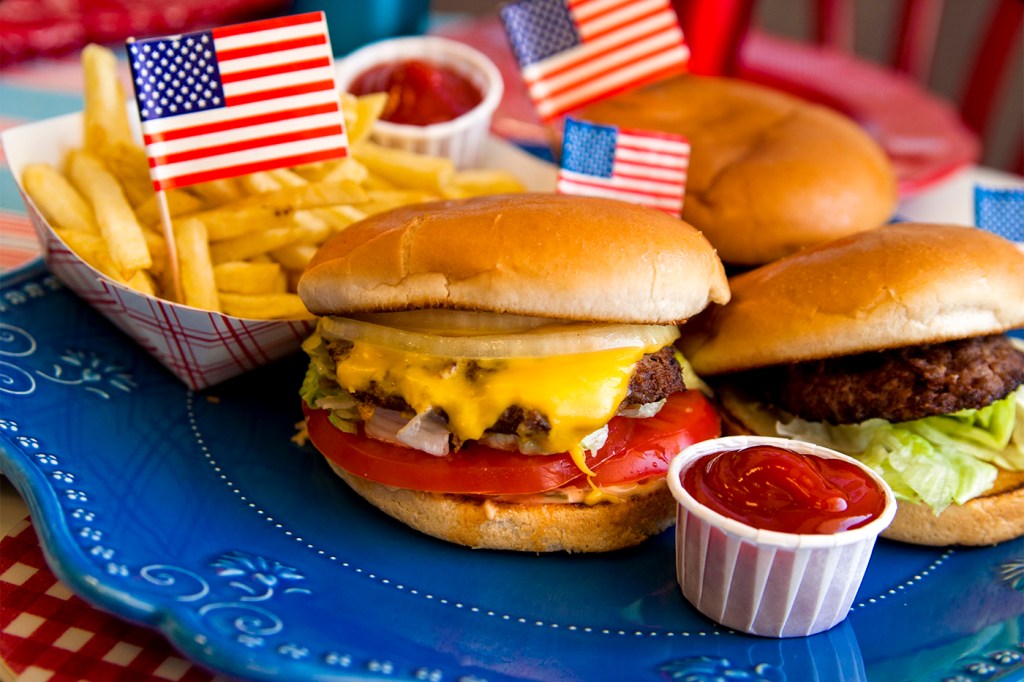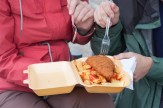Avoid food poisoning this Memorial Day weekend by following these tips

From a young age, you are told to look both ways before you cross the street and heed the warning of stranger danger on the internet. But with food, it is crucial to think that there is always something potentially out there that is of concern.
“It’s not to freak people out,” says Darin Detwiler, a professor of food policy at Northeastern University. “We have to realize there are potential dangers out there, and we don’t want to cast a shadow on our get-togethers and barbecues.”
The good news is there are easy things to do to lessen the chance of getting food poisoning as families and friends celebrate the Memorial Day holiday this weekend.
Detwiler spoke to Northeastern Global News about common barbecue food pitfalls that get people in trouble and how to avoid them. His comments have been edited for brevity and clarity.
What are the most common pitfalls you see people do?

One common mistake is, ‘I made this incredible potato salad and macaroni salad,’ but they put it in their car and drive for a couple of hours and get to a barbecue. And then they leave it sitting for hours and hours and hours.
If it is meant to be cold, we truly need to keep it cold. This could be for condiments, potato salads, cheeses and deli meats.
It is important to use ice packs, blue freezer packs and ice to keep things cold and insulated during transport.
Sometimes it’s best to think in terms of smaller batches. For example, instead of a humongous bowl of potato salad, make two or three smaller bowls, leave two in the refrigerator and bring them out later.
The same thing can be said about hot foods. You got to keep hot foods hot. There are many situations where I asked why someone got sick. Well, it’s because someone cooked a ton of hamburger patties at a barbecue all at once and left them sitting there.
One way to solve the problem is to keep them warm with burners or to cook them in smaller batches. It is paramount to cook things at the right temperature because that is the only kill step at this stage. If you don’t cook meat until it is fully cooked, then you’re not killing pathogens in the food. Use a thermometer for hamburgers. You cannot tell visually if it is cooked all the way through. People guess all of the time. If you are not doing that, you are setting up a recipe for disaster.
How can you avoid cross-contamination?
Are people washing their hands? If there are finger foods and guests grab things after playing frisbee or football, that’s not good. Try making it so fewer people put their hands on the food you put in your mouth. Divide things up, and package them, rather than having a large bowl.
Be aware of the surfaces being used. In one instance, food contamination arose when guests brought raw patties on a plate, cooked the hamburgers and then put them back on the same plate.
That’s the kind of thing that happens when you’re not thinking things through.
Sometimes less is more. Maybe you don’t have chicken, hotdogs and fish. A similar approach to the foods can help make sure the right temperatures and food safety precautions are taken.
Who can be most affected by foodborne illness?
Everyone can get sick from a foodborne pathogen. However, for most healthy adults, it’s an inconvenience, and they get sick for a couple of days. But it is the most vulnerable populations that are most likely to be impacted greatly—where someone is sick enough to go to the doctor, go on dialysis and worst cases, death.
The vulnerable population includes those under 5, the elderly, pregnant and immune-compromised.
How do you clean a grill?
At parks and campgrounds, people use the communal barbecue. You want to clean it. Avoid using a wire brush because bits can fall off and get into the food.
Get there in advance and have a fire going for a while before you start cooking food. People cut an onion and potato in half and use a long fork to clean the grill. The onion cleans the surface, and the starches from the potato prevent food from being stuck to the grill.
Other people bring their barbecue grill and put it on top. Ensure it is clean and has a barrier to the cooking surface.
How do you keep things clean outside?
Bring hand sanitizer and a bucket of water with cleaning solutions to clean utensils between uses.
How do you avoid allergens?
If you invite a bunch of people over, simply ask if anyone has a food allergy. Maybe someone is allergic to sesame or peanuts. In some cases, someone can get sick not even by eating it but by being around it because it spreads to surfaces.
How do you deal with vegetarians and vegans?
When preparing a dish, think about what ingredients you’re putting into it. For instance, if you are bringing a salad, if you want to have sesame or bacon crumbles on it, have those on the side. Otherwise, it is a perfectly good salad, but a vegetarian isn’t going to eat it.
How to monitor the food?
If you’re going to be the host, you have to think about how your mom or grandma will supervise the food. You don’t want flies on it. You don’t want birds to get on it. Are things getting cold or losing their cool?
At the end of the day, often, people say, ‘I don’t want to throw it away.’ But, if it has been sitting out for hours, at some point, maybe it’s better off tossing it.
We don’t want a family get-together to be undermined. You don’t want to be remembered as ‘that was the event.’
It’s not like it will make the headlines, but people get sick all the time.
How often does food poisoning happen?
Each year 48 million Americans get sick from foodborne pathogens. About 128,000 are hospitalized and 3,000 people die every year.
We cannot take the safety aspect for granted. You don’t want that experience to be remembered for the wrong reasons.
Beth Treffeisen is a Northeastern Global News reporter. Email her at b.treffeisen@northeastern.edu. Follow her on Twitter @beth_treffeisen.






